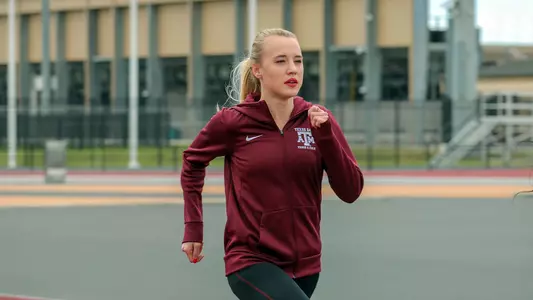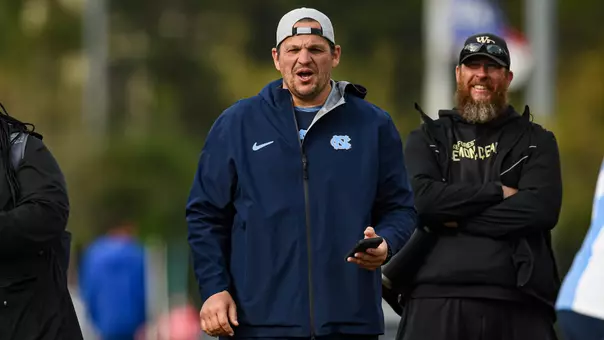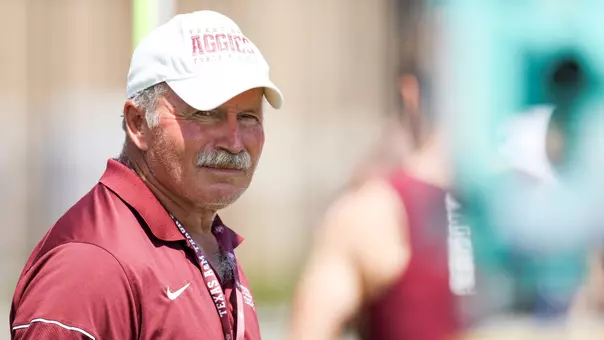
Photo by: Texas A&M Athletics
An Unsinkable Spirit
Apr 08, 2019 | Track and Field
Charean Williams highlights Nadia Pakes' life journey from Russia to Aggieland.
Nadia Pakes has butterflies on the wallpaper in her bathroom. She has a butterfly necklace. She has butterfly earrings. She has pictures of butterflies. She has a butterfly scarf.
On her mother's birthday four years ago, the Texas A&M middle distance runner gave Debbie Pakes a card covered in butterflies. Inside she wrote, "Am I butterfly yet?"
"A caterpillar can believe that it's beautiful, but you have to experience the change, and know it's OK to put yourself out there before you can truly become a beautiful butterfly," Nadia Pakes said.
Pakes, who graduates in May with a degree in sports management and a minor in business, has her wings now. But the journey that took her the 5,943 miles from her birthplace to College Station was much farther than that. Once a 300-meter hurdler in high school, Nadia's personal track was filled with even higher hurdles.
"Whenever somebody looks at me, they have no idea," said Pakes, a walk-on who has spent four years on the A&M women's track and field team. "They think, 'Oh, she goes to A&M. She runs track. She has everything figured out.' No one knows. The first half of my life was so different and anything but flowers and butterflies. It was not a very easy life. You have to be very independent and very strong to not get picked on being in the situation I was in, so I think that really shaped me to be who I am now."
Pakes' story begins in Nyagan, Russia, in 1996 when her young, unwed mother abandoned her at a hospital in the small Western Siberian city.

Since then, Pakes' metamorphosis has included two changes of her first name, two changes of her last name and three mothers. In between two adoptions, Pakes lived in a juvenile holding center and then an orphanage.
It was 13 years ago that she found her forever home in Austin with her American parents, Ted and Debbie Pakes, and brothers, Reid and Riley. Nadia was adopted into an Aggie family, with Ted and Debbie Pakes both 1989 graduates, Reid in the Class of 2016 and Riley in the Class of 2021.

"Nadia means hope in Russia," Debbie Pakes said. "Walking that journey with her, there were some rough moments and rough things, but she has just such an unsinkable spirit. She's so optimistic, one of those kind of Anne Frank personalities who sees the good in everybody regardless of what's going on around her.
"I think to her credit, she grabbed her opportunities that were in front of her and just ran with them – literally and figuratively. Statistically, she beat the odds."
FROM RUSSIA, WITH LOVE
A single woman from Nyagan named Luba adopted the 6-week-old baby abandoned in the hospital. The woman, an engineer, renamed her child Nadezhda. In a blog post online, Nadia talks of receiving "love and protection" from her adopted mother at a "young and critical age."
Nadia still speaks lovingly of her Russian mother.
Luba, though, was in an abusive relationship, and one brutal beating left her partially blind and battered physically and mentally. Luba's mental illness began to consume her when Nadia was only 5.
"Later on, we found out she had bipolar disorder," Nadia said. "But as a kid, I had no idea. She would tell me different things or stories that weren't realistic, and I didn't understand. Gradually, she started to forget to take care of me. I started getting malnourished, because she would just forget to feed me. People in the apartment where we lived started to notice."
For roughly a year, Nadia begged for food from neighbors. She survived on her own, at times helping her mother more than her mother helped her.
"I was really, really thin," Nadia said. "I was really frail. They said I was malnourished. My eye sight started getting really bad. But as a kid, I didn't know anything different. I didn't think things were that bad because I didn't know any better. That was just my normal."
Finally, when Nadia was 6, the Russian government terminated the adoption.
Nadia tells the story matter of fact, as if it is someone else's life. But she will never forget being taken away from the only home -- and the only mother -- she had known as a "terrified, emaciated and heartbroken" child.
She stayed six months in a juvenile holding center before being sent to an orphanage, joining 150 other children without families of their own. Nadia was placed with older girls, whom she quickly befriended.
The only thing that didn't change in Nadia's life was her church. She continued to attend the same Russian Orthodox Church.

"That's where I used to go with my mom," Nadia said, "so with everything I was going through, it was the one consistent thing I had in my life. It was very comforting.
"The one person in my life who mattered the most was my mom, and she got taken from me. But I knew my faith could never be taken away. That was just a really big thing for me to rely on, because even when I felt like I lost everything going to the orphanage, it was the one thing I felt like I always had."
FROM AMERICA, WITH LOVE
Ted and Debbie Pakes had Reid two years after they were married. They both wanted their son to have a sibling, but Debbie had trouble getting pregnant again. Four years, several infertility treatments and a miscarriage later, they found themselves at the "end of our rope."
That was when adoption first crossed their minds. But three months after her miscarriage, Debbie became pregnant, and Riley joined the family nine months later.
"But I had a nagging feeling I could not shake," Debbie Pakes wrote in a book about Nadia's adoption. "We felt we needed a second child, but somewhere out there a child needed us."
Friends recently had adopted a child from Russia, which, at the time, had 800,000 children classified as orphans. That renewed the tug at Debbie's heartstrings. Debbie, though, had to convince Ted.
As it turned out, Nadia convinced Ted.
Nadia arrived as a frail 7-year-old at the recreation center in Bastrop, Texas, as part of Project Hope, a program that allowed older Russian orphans stay with American families for two weeks.


"We made the decision pretty much immediately that we wanted to adopt her," Debbie said. "Nadia, on the other hand, was not an easy sell."
Once Nadia returned to Russia, the family stayed in touch with her through phone calls every Saturday. But Russia was slow with approvals, and days became weeks, weeks became months and months became more than a year. Nadia began to view the Pakes like all the other adults who had let her down.
Nadia asked them to stop the adoption process, and an email from someone at the orphanage told the Pakes to "go away."
"We kept moving ahead, even though she hadn't bought in," Debbie said.
In her second – and last – visit to the orphanage, Luba gave Nadia her blessing. The Russian woman, in a moment of clarity, realized her diminished mental state and the termination of her parental rights meant a dismal future for Nadia without an American adoption.

Government red tape delayed the process even longer. Finally, after 18 months, weeks before Nadia's 10th birthday, the Pakes made her adoption official. Except no one told Nadia, and the Pakes, who spoke no Russian, had no idea Nadia didn't understand.
Nadia sobbed uncontrollably, confused and frightened after being "plucked from my home of four years with no say in the matter and transplanted to America."
"In Nadia's heart, [Luba] was her mom," Debbie said. "Nothing against us, but we weren't her family. We weren't in Russia."
TAUGHT TO FLY
Debbie, a teacher and counselor, finally reached Nadia with the story of the butterfly and "how it begins as a caterpillar so unlike the beautiful creature it is destined to become." Debbie told her that "only by having the courage to give up being a caterpillar can the metamorphosis truly begin."
Debbie asked Nadia to write all the "amazing attributes" about herself. Nadia listed kindness, humor, optimism and empathy among others. Debbie then told Nadia to cross off what was stripped away during her childhood. Trust was the only word to go.

"I learned independence at an early age," Nadia wrote in a blog post about her life. "Learning dependence was the bigger challenge."
It took a while, but Nadia finally began calling Debbie "mom." She needed a little longer to begin referring to Ted as "dad."
Nadia has never returned to Russia but often wonders what happened to Luba. If not for her Russian mother's permission, Nadia never would have accepted the gift of an American family who loves her as much as Luba did.
Nadia, now 23, speaks with hardly a hint of a Russian accent, though without the Texas accent she once coveted. Anyone who doesn't know would think Nadia is a typical American kid, including the Haitians she shared her life story with, through a translator, during a mission trip.
Nadia's story so moved a 14-year-old girl that, for the first time, she opened up about the loss of her parents during Hurricane Matthew in 2016. An abusive uncle took in the remaining children, and the young girl, with visible scars covering her face and body, told of the beatings she endured to save her siblings from the same.
"That meant so much to me that she would share her story," Nadia said. "You don't have to speak the same language or be from the same place to understand or have a connection with someone. That's why I love being able to share my story. That made me truly realize how powerful it can be just to be completely vulnerable and open."
AM I A BUTTERFLY YET?
Not long before leaving for her freshman year at A&M, Nadia wrote in her mother's birthday card, "Am I a butterfly yet?"
Debbie wrote, "The funny thing about butterflies is they cannot see their own wings. They cannot see how incredibly beautiful they are, how much they amaze us with their gentle strength. Yes, my sweet daughter, you are absolutely a butterfly. You ALWAYS were."
On her mother's birthday four years ago, the Texas A&M middle distance runner gave Debbie Pakes a card covered in butterflies. Inside she wrote, "Am I butterfly yet?"
"A caterpillar can believe that it's beautiful, but you have to experience the change, and know it's OK to put yourself out there before you can truly become a beautiful butterfly," Nadia Pakes said.
Pakes, who graduates in May with a degree in sports management and a minor in business, has her wings now. But the journey that took her the 5,943 miles from her birthplace to College Station was much farther than that. Once a 300-meter hurdler in high school, Nadia's personal track was filled with even higher hurdles.
"Whenever somebody looks at me, they have no idea," said Pakes, a walk-on who has spent four years on the A&M women's track and field team. "They think, 'Oh, she goes to A&M. She runs track. She has everything figured out.' No one knows. The first half of my life was so different and anything but flowers and butterflies. It was not a very easy life. You have to be very independent and very strong to not get picked on being in the situation I was in, so I think that really shaped me to be who I am now."
Pakes' story begins in Nyagan, Russia, in 1996 when her young, unwed mother abandoned her at a hospital in the small Western Siberian city.

Since then, Pakes' metamorphosis has included two changes of her first name, two changes of her last name and three mothers. In between two adoptions, Pakes lived in a juvenile holding center and then an orphanage.
It was 13 years ago that she found her forever home in Austin with her American parents, Ted and Debbie Pakes, and brothers, Reid and Riley. Nadia was adopted into an Aggie family, with Ted and Debbie Pakes both 1989 graduates, Reid in the Class of 2016 and Riley in the Class of 2021.

"Nadia means hope in Russia," Debbie Pakes said. "Walking that journey with her, there were some rough moments and rough things, but she has just such an unsinkable spirit. She's so optimistic, one of those kind of Anne Frank personalities who sees the good in everybody regardless of what's going on around her.
"I think to her credit, she grabbed her opportunities that were in front of her and just ran with them – literally and figuratively. Statistically, she beat the odds."
FROM RUSSIA, WITH LOVE
A single woman from Nyagan named Luba adopted the 6-week-old baby abandoned in the hospital. The woman, an engineer, renamed her child Nadezhda. In a blog post online, Nadia talks of receiving "love and protection" from her adopted mother at a "young and critical age."
Nadia still speaks lovingly of her Russian mother.
Luba, though, was in an abusive relationship, and one brutal beating left her partially blind and battered physically and mentally. Luba's mental illness began to consume her when Nadia was only 5.
"Later on, we found out she had bipolar disorder," Nadia said. "But as a kid, I had no idea. She would tell me different things or stories that weren't realistic, and I didn't understand. Gradually, she started to forget to take care of me. I started getting malnourished, because she would just forget to feed me. People in the apartment where we lived started to notice."
For roughly a year, Nadia begged for food from neighbors. She survived on her own, at times helping her mother more than her mother helped her.
"I was really, really thin," Nadia said. "I was really frail. They said I was malnourished. My eye sight started getting really bad. But as a kid, I didn't know anything different. I didn't think things were that bad because I didn't know any better. That was just my normal."
Finally, when Nadia was 6, the Russian government terminated the adoption.
Nadia tells the story matter of fact, as if it is someone else's life. But she will never forget being taken away from the only home -- and the only mother -- she had known as a "terrified, emaciated and heartbroken" child.
She stayed six months in a juvenile holding center before being sent to an orphanage, joining 150 other children without families of their own. Nadia was placed with older girls, whom she quickly befriended.
The only thing that didn't change in Nadia's life was her church. She continued to attend the same Russian Orthodox Church.

"That's where I used to go with my mom," Nadia said, "so with everything I was going through, it was the one consistent thing I had in my life. It was very comforting.
"The one person in my life who mattered the most was my mom, and she got taken from me. But I knew my faith could never be taken away. That was just a really big thing for me to rely on, because even when I felt like I lost everything going to the orphanage, it was the one thing I felt like I always had."
FROM AMERICA, WITH LOVE
Ted and Debbie Pakes had Reid two years after they were married. They both wanted their son to have a sibling, but Debbie had trouble getting pregnant again. Four years, several infertility treatments and a miscarriage later, they found themselves at the "end of our rope."
That was when adoption first crossed their minds. But three months after her miscarriage, Debbie became pregnant, and Riley joined the family nine months later.
"But I had a nagging feeling I could not shake," Debbie Pakes wrote in a book about Nadia's adoption. "We felt we needed a second child, but somewhere out there a child needed us."
Friends recently had adopted a child from Russia, which, at the time, had 800,000 children classified as orphans. That renewed the tug at Debbie's heartstrings. Debbie, though, had to convince Ted.
As it turned out, Nadia convinced Ted.
Nadia arrived as a frail 7-year-old at the recreation center in Bastrop, Texas, as part of Project Hope, a program that allowed older Russian orphans stay with American families for two weeks.


"We made the decision pretty much immediately that we wanted to adopt her," Debbie said. "Nadia, on the other hand, was not an easy sell."
Once Nadia returned to Russia, the family stayed in touch with her through phone calls every Saturday. But Russia was slow with approvals, and days became weeks, weeks became months and months became more than a year. Nadia began to view the Pakes like all the other adults who had let her down.
Nadia asked them to stop the adoption process, and an email from someone at the orphanage told the Pakes to "go away."
"We kept moving ahead, even though she hadn't bought in," Debbie said.
In her second – and last – visit to the orphanage, Luba gave Nadia her blessing. The Russian woman, in a moment of clarity, realized her diminished mental state and the termination of her parental rights meant a dismal future for Nadia without an American adoption.

Government red tape delayed the process even longer. Finally, after 18 months, weeks before Nadia's 10th birthday, the Pakes made her adoption official. Except no one told Nadia, and the Pakes, who spoke no Russian, had no idea Nadia didn't understand.
Nadia sobbed uncontrollably, confused and frightened after being "plucked from my home of four years with no say in the matter and transplanted to America."
"In Nadia's heart, [Luba] was her mom," Debbie said. "Nothing against us, but we weren't her family. We weren't in Russia."
TAUGHT TO FLY
Debbie, a teacher and counselor, finally reached Nadia with the story of the butterfly and "how it begins as a caterpillar so unlike the beautiful creature it is destined to become." Debbie told her that "only by having the courage to give up being a caterpillar can the metamorphosis truly begin."
Debbie asked Nadia to write all the "amazing attributes" about herself. Nadia listed kindness, humor, optimism and empathy among others. Debbie then told Nadia to cross off what was stripped away during her childhood. Trust was the only word to go.

"I learned independence at an early age," Nadia wrote in a blog post about her life. "Learning dependence was the bigger challenge."
It took a while, but Nadia finally began calling Debbie "mom." She needed a little longer to begin referring to Ted as "dad."
Nadia has never returned to Russia but often wonders what happened to Luba. If not for her Russian mother's permission, Nadia never would have accepted the gift of an American family who loves her as much as Luba did.
Nadia, now 23, speaks with hardly a hint of a Russian accent, though without the Texas accent she once coveted. Anyone who doesn't know would think Nadia is a typical American kid, including the Haitians she shared her life story with, through a translator, during a mission trip.
Nadia's story so moved a 14-year-old girl that, for the first time, she opened up about the loss of her parents during Hurricane Matthew in 2016. An abusive uncle took in the remaining children, and the young girl, with visible scars covering her face and body, told of the beatings she endured to save her siblings from the same.
"That meant so much to me that she would share her story," Nadia said. "You don't have to speak the same language or be from the same place to understand or have a connection with someone. That's why I love being able to share my story. That made me truly realize how powerful it can be just to be completely vulnerable and open."
AM I A BUTTERFLY YET?
Not long before leaving for her freshman year at A&M, Nadia wrote in her mother's birthday card, "Am I a butterfly yet?"
Debbie wrote, "The funny thing about butterflies is they cannot see their own wings. They cannot see how incredibly beautiful they are, how much they amaze us with their gentle strength. Yes, my sweet daughter, you are absolutely a butterfly. You ALWAYS were."
Players Mentioned
NCAA West Preview: Pat Henry
Tuesday, May 27
Pluckers Playmakers: Episode 5
Wednesday, May 07
44 Farms Preview: Pat Henry
Thursday, April 10
44 Farms Preview: Auhmad Robinson
Thursday, April 10
















